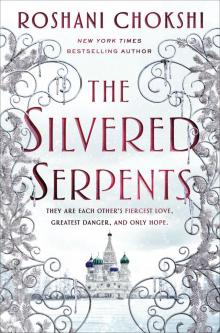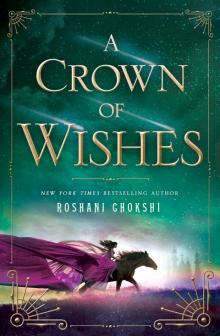- Home
- Roshani Chokshi
The Silvered Serpents
The Silvered Serpents Read online
Begin Reading
Table of Contents
About the Author
Copyright Page
Thank you for buying this
St. Martin’s Press ebook.
To receive special offers, bonus content,
and info on new releases and other great reads,
sign up for our newsletters.
Or visit us online at
us.macmillan.com/newslettersignup
For email updates on the author, click here.
The author and publisher have provided this e-book to you for your personal use only. You may not make this e-book publicly available in any way. Copyright infringement is against the law. If you believe the copy of this e-book you are reading infringes on the author’s copyright, please notify the publisher at: us.macmillanusa.com/piracy.
To Nicolas Cage, the muse I didn’t ask for
Oh Faustus, lay that damned book aside,
And gaze not on it lest it tempt thy soul
And heap God’s heavy wrath upon thy head.
—FAUSTUS
PROLOGUE
Thirteen years ago …
The matriarch of House Kore adjusted the Christmas present in her arms. It was a portable little theatre, full of brightly painted figurines and miniature objects—swords and capes, whirring carousels, and even a rich velvet curtain controlled by a small drawstring mechanism. Séverin would love it. She had planned the surprise after last week, when she had taken him to the theatre. Most six-year-olds would have looked at the stage, but Séverin had spent the whole time watching the audience.
“You’re missing the show, my dear,” she’d said.
Séverin looked up at her, large violet eyes questioning.
“Am I?”
She’d let him be after that, and afterwards he’d told her in a rush how peoples’ faces changed when something happened on the stage. It seemed the magic of the performance had somehow been both entirely lost on and entirely understood by him.
The matriarch smiled to herself as she walked up the stone steps of the House Vanth manor where the bright lights of the Winter Conclave beckoned. Although this year’s Winter Conclave took place in the cold shadow of the Rhône-Alpes Mountains, the itinerary had not changed in centuries. Each House of the Order of Babel would bring new and unmarked Forged treasures from their colonies to be redistributed in the Midnight Auction. It was a test for the many Houses, and a representation of their country’s wealth and imperialism if they could bring in not only their own treasures, but purchase new ones. All Houses had a specific interest, but some had enough resources to diversify their interests.
House Kore had an eye toward botanical advancements, but her illustrious wealth and coffers brimmed with as much varied treasure as there were languages in the world. Others, like House Dazbog of Russia, drew little income from their colonies and could trade only in secrets and parchment. Regardless of the differences between the Order’s attending Houses, the purpose of the Winter Conclave never changed: to renew their pledge to safeguard Western civilization and its treasures, to keep safe the Babel Fragments, and thus preserve the divine art of Forging.
But as lofty as it sounded, it was, essentially, a festivity.
The manor of House Vanth drank in the early winter sunlight, chimney smoke curling catlike along the roof. She could almost sense the fête inside: cinnamon sticks soaking in goblets of mulled wine, pine wreaths and ornamental snow Forged to spangle in the air like caught stars … and Séverin. Sweet and earnest and observant. The child she would have chosen for herself.
The matriarch moved her hand across her flat belly. Sometimes when she walked, she thought she could feel the hollow parts of herself jangling together. But when she looked down, she caught sight of her Babel Ring, and she held her chin higher. Power liked irony, she thought. She had been denied a woman’s power to give birth, but granted the power her birth as a woman should have denied. Her family still bristled at how she had become matriarch of House Kore.
But they didn’t have to like it.
They just had to obey it.
Flanking the wrought iron manor door stood two large pine trees decorated with dripping candles. The House Vanth butler greeted her at the top of the steps.
“Welcome, Madame, please allow me to assist—” he said, taking the gift.
“Careful with that,” she said sternly.
She rolled her shoulders, curiously missing the weight of the box, which, for a moment, had reminded her of what it felt like to carry Séverin … warm and sleepy in her arms as she had returned him to his home after the theatre.
“Pardon, Madame,” said the butler guiltily. “Though I do not wish to detain you from the festivities … she, ah, wished to speak with you.”
She.
The pine tree on her left rustled slightly as a woman stepped out from behind it.
“Leave us,” said the woman to the butler.
The butler promptly did as she asked. The matriarch felt a stab of reluctant admiration for the woman who held neither power nor status in House Vanth, but commanded it anyway. Lucien Montagnet-Alarie had brought her back with him after an artifact excursion to Algeria, and six months later she gave birth to their child, Séverin. There were plenty of women like her, women carried into another country while carrying a white man’s child. Not quite wife or lover, but an exotic ghost haunting the halls and edges of society.
But the matriarch had never met a woman with those eyes.
Séverin could pass for a boy of France, but his eyes belonged to his mother: dusky and violet, the night sky veiled in smoke.
The Order of Babel had ignored this woman just as soundly as they had ignored the Haitian mother of the House Nyx heir … but there was something about the Algerian woman that demanded noticing. Maybe it was because she flaunted protocol, wearing her absurd tunics and scarves. Or maybe it was due to the rumors she cast before her, vast as her own shadow. That she had powers that didn’t even look like any Forging affinity. That the patriarch of House Vanth had found her in an enchanted cave, a dark-eyed mirage who appeared as if from nowhere.
That she had secrets.
“You have no right to corner me like this,” said the matriarch.
Kahina ignored this.
“You brought something for him,” she said.
Not a question.
“What of it?” the matriarch shot back.
Guilt flickered through her when she caught Kahina’s gaze: hungry. Hungry for all that the matriarch could do that was denied to her. Kahina had the power to give birth to him, but not the privilege to call him her son.
Power liked irony.
“Why did you choose that present?” Kahina asked.
The question threw the matriarch. What did it matter? She simply thought he’d like it. She could already imagine him crouched behind the toy theatre, moving the puppets, his face not on the wooden stage but the imagined audience. He had a knack for understanding how things fit together. How to draw the eye. Perhaps he would grow up to be an artist, she mused.
“Do you love him?” asked Kahina.
“What—”
“Do you love my son?”
My son. The words felt like a slap. The matriarch of House Kore could take him to the theatre, shower him with gifts, but he was not hers. And yet, her heart did not notice.
“Yes,” she said.
Kahina nodded once, as if steeling herself, and then said: “Then, please … you must promise to protect him.”
PART I
From the archival records of the Order of Babel
Master Boris Goryunov, House Dazbog of the Order’s Russian faction 1868, reign of Czar Nicholas II
On this day, I
took my men to Lake Baikal. We waited until night fell. The men were scared and spoke of restless spirits in the water, but they are simple-minded and perhaps overly swayed by the reports of screaming girls. It is possible some Forged object of the mind has driven the locals insane, and for that reason I have investigated but found nothing. I have dutifully requested the assistance of the Order, but I doubt we shall find anything. I heard no haunting calls of dying women, which means they either never existed or are already beyond my help.
1
SÉVERIN
Three weeks before Winter Conclave …
Séverin Montagnet-Alarie looked out over what had once been the Seven Sins Garden. Rare, coveted blossoms once coated the grounds—milk-petaled aureum and chartreuse golden moss, skeleton hyacinths and night-blooming cereus. And yet, it was the roses that his brother, Tristan, loved most. They were the first seeds planted, and he’d fussed over them until their petals ripened red and their fragrance bloomed to create something that looked and smelled like melted sin.
Now, in late December, the grounds appeared stripped and barren. When Séverin breathed deep, cold seared through his lungs.
The grounds were almost scentless.
If he wanted, he could have asked his factotum to hire a gardener with a Forging affinity for plant matter, someone who could maintain the garden’s splendor, but he didn’t want a gardener. He wanted Tristan.
But Tristan was dead, and the Seven Sins Garden had died with him.
In its place lay a hundred Forged reflection pools. Their mirror-still surfaces held images of desert landscapes or skies quilted with dawn light when nighttime had already stolen across the grounds. The guests of L’Eden Hotel applauded his artistry, not knowing that it was shame, not artistry, that had guided Séverin. When he looked in those pools, he didn’t want to catch sight of his own face staring back at him.
“Monsieur?”
Séverin turned to see one of his guards striding toward him.
“Is he ready?” asked Séverin.
“Yes, Monsieur. We arranged the room precisely as you requested. Your … guest … is inside the office outside the stables, just as you asked.”
“And do we have tea to serve our guest?”
“Oui.”
“Très bon.”
Séverin took a deep breath, his nose wrinkling. The rose canes had been burned and yanked out at the root. The grounds had been salted. And yet, even months later, he still caught the phantom scent of roses.
* * *
SÉVERIN HEADED TOWARD a small building near the horse stables. As he walked, he touched Tristan’s old penknife, now tucked into his jacket pocket. No matter how many times he washed the blade, he still imagined he could feel the small bird feathers and bone splinters that had once clung to the metal, remnants of Tristan’s kills … proof of the twisted violence his brother had tried so hard to hide.
Sometimes he wished he’d never known. Maybe then he would have never gone to Laila’s room. All he’d wanted was to dissolve her ludicrous oath to act as his mistress during the Winter Conclave.
But he didn’t find her. Instead, he had found letters addressed to Tristan, and his brother’s gardening satchel—the same one Laila swore had gone missing—untied beside them.
I had thought not reading your objects was for the best, my dearest Tristan. But every day I ask myself if I might’ve caught the darkness inside you earlier. Perhaps, then, you might not have turned to those poor birds. I see it in the blade. All those kills. All your tears. I may not have understood all of you, but I love you wholeheartedly and pray you might forgive me—
Even before this, Séverin knew he’d failed in his only promise to Tristan: to protect him. Now he saw how deep that failure stretched. All he saw were paths not taken. Every time Tristan wept, and he’d left the room to give him privacy. Every time Tristan had furiously stomped into his greenhouse and stayed there for days. He should’ve gone. Instead, he let his brother’s demons feed on him.
When he read those letters, it wasn’t just Tristan’s dead stare that swam before his eyes but everyone’s gazes—Enrique, Zofia, Hypnos. Laila. He saw their eyes milky with death, death that he’d let happen because he hadn’t been enough to protect them. Hadn’t known how.
Eventually, Laila caught him in her rooms. He’d never quite remembered all that she’d said to him, except for her last words: “You cannot protect everyone from everything. You’re only human, Séverin.”
Séverin closed his eyes, his hand on the doorknob of the office.
“Then that must change.”
* * *
SÉVERIN CONSIDERED HIMSELF something of an artist when it came to interrogation.
It came down to the details, all of which needed to look coincidental rather than controlled: the chair with uneven legs; the room’s cloying scent of too-sweet flowers; the too-salty snacks provided earlier. Even the lighting. Concealed glass shards refracted the sunlight, casting glares on everything from the walls to the ceiling, so that only the wooden table laden with a warm and fragrant tea service earned notice.
“Comfortable?” asked Séverin, taking a seat across from the man.
The man flinched. “Yes.”
Séverin smiled, pouring himself tea. The man before him was thin and pale, with a hunted look to his face. He eyed the tea warily until Séverin took a long sip.
“Would you like some?” asked Séverin.
The man hesitated, then nodded.
“Why … why am I here? Are you…” his voice dropped to a whisper, “… are you with the Order of Babel?”
“In a fashion.”
Months after they broke into House Kore’s home, the Order of Babel had hired Séverin’s crew to find the Fallen House’s hidden treasure, rumored to be in an estate called the Sleeping Palace, though no one knew where that was. In exchange, Séverin would be allowed to catalogue and analyze these treasures for himself, a privilege unheard of outside the Order. Then again, he should have been one of them, but he no longer wanted that mantle. Not after Tristan.
The Order claimed they wanted the treasure to gut whatever power the Fallen House still had left … but Séverin knew better. The Fallen House had shown their cards. They were snakes that cast large shadows. Without their treasure, they would be irredeemably weakened, true, but the real reason behind the Order’s search was simple. The colonies brimmed with treasure—rubber in the Congo, silver in the Potosi Mines, spices in Asia. The lost wonders inside the Fallen House’s hoard were too tantalizing not to pursue, and Séverin knew the members of the Order would fall upon it like wolves. Which meant he had to get to it first. He didn’t care for its gold or silver, he wanted something far more precious:
The Divine Lyrics.
A treasure the Order would not even notice had gone missing, for it had always been considered lost. The lore of the Order of Babel held that The Divine Lyrics contained the secret for joining the world’s Babel Fragments. Once joined, the book could rebuild the Tower of Babel and thus access the power of God. It was an effort that had gotten the Fallen House exiled fifty years ago. And yet, the book had long been missing, or that was what everyone had thought …
Until Roux-Joubert’s tongue slipped.
After the battle in the catacombs, the captured Fallen House members proved to be useless informants. Each had not only taken their lives, but also burned off their faces and fingertips, thus escaping recognition. Only Roux-Joubert had failed. After he killed Tristan, he bit down instead of swallowing the suicide pill required to take his secrets to the grave. He had died slowly over weeks, and in a fit of madness began to speak.
“The doctor’s papa is a bad man,” he said, laughing hysterically. “You know all about bad fathers, Monsieur, you sympathize I am sure … oh how unkind … he will not let the doctor into the Sleeping Palace … but the book is there, waiting for him. He will find it. He will give us life after death…”
He? The question haunted Séverin, but there wa
s no surviving record of the last Fallen House patriarch, and though the Order seemed disappointed the Sleeping Palace could not be found … at least they felt reassurance in the knowledge the Fallen House could not find it either.
Only he and Hypnos, the patriarch of House Nyx, had continued searching, scouring records and receipts, hunting for any inconsistencies which eventually led them to the man who sat in front of Séverin. An old, shriveled man who had managed to hide for a very long time.
“I have paid my dues,” said the man. “I was not even part of the Fallen House, merely one of its many solicitors. And I told the Order before that when the House fell, they gave me a draught, and I remember nothing of its secrets. Why drag me here? I have no information worth knowing.”
Séverin set down his teacup. “I believe you can lead me to the Sleeping Palace.”
The man scoffed. “No one has seen it in—”
“Fifty years, I know,” said Séverin. “It’s well hidden, I understand. But my contacts tell me the Fallen House created a special pair of lenses. Tezcat spectacles, to be precise, which reveal the location of the Sleeping Palace and all its delicious treasures.” Séverin smiled. “However, they entrusted these spectacles to a unique person, someone who does not know what they guard.”
The man gaped at him.
“H-how—” He caught himself, then cleared his throat. “The Tezcat spectacles are mere rumor. I certainly don’t possess them. I know nothing, Monsieur. I swear on my life.”
“Poor choice of words,” said Séverin.
He removed Tristan’s penknife from his pocket, tracing the initials on it: T.M.A. Tristan had lost his surname, and so Séverin had shared his. At the base of the knife was an ouroboros, a snake biting its tail. It was once the symbol of House Vanth, the House he might have been patriarch of—if things had gone according to plan … if that dream of inheritance had not killed the person closest to him. Now it was a symbol of all he would change.

 The Gilded Wolves
The Gilded Wolves The Star-Touched Queen
The Star-Touched Queen Aru Shah and the Song of Death
Aru Shah and the Song of Death The Silvered Serpents
The Silvered Serpents Death and Night--A Star-Touched Novella
Death and Night--A Star-Touched Novella A Crown of Wishes
A Crown of Wishes Aru Shah and the End of Time
Aru Shah and the End of Time Star-Touched Stories
Star-Touched Stories The Vishakanya's Choice
The Vishakanya's Choice